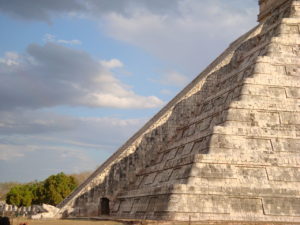This is the second part of 12 Reasons why I follow the Heathen Gods and not the Christian One. If you want to read the first part, you can read it HERE.
In the last piece, I slammed the Christian faith, but I realized I didn’t really address Heathen beliefs. So, even though this includes comments about how Christianity differs, my main focus is on Heathenry.
So, let’s get started and see why I prefer Heathenry over Christianity.
8. Heathenry doesn’t care whom you worship or who worships our Heathen gods
In most forms, Heathenry really doesn’t care if you worship our gods, the Christian god, some other pantheon, or no god. In the past Heathens would worship gods from different cultures alongside the Norse/Germanic gods. Granted, it seems a little incongruous to worship the white Christ alongside Thor, but there you go. I personally think it’s folly to worship the Christian god alongside our gods, because the Christian god has made it abundantly clear he does not want to be worshiped alongside pagan gods.
But, if I want to honor Tyr, Skadi, Perun, Zisa, and some other god, that’s no big deal to Heathenry, for the most part. (Yeah, there are wankers in every religion, including ours, who will say that’s not Heathenry, but they’re not Asa-popes, so ignore them.) The main part of Heathenry is that you accept our Nordic gods and goddesses, and that’s about it.
Our Gods are Colorblind
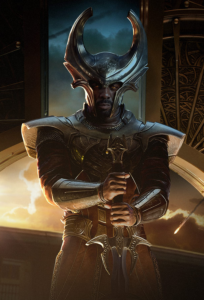 Also, our gods and goddesses are colorblind. That means that it doesn’t matter what ethnicity you come from, if you’re Heathen, you’re with us. Yeah there are some folkish (AKA racist) types who have decided for whatever bizarre reason that only white, Northern peoples can worship our gods, but that’s totally incorrect, especially given the recent DNA and bone mineral compositions discovered in archaeology. People who have occupied Viking burials have proven to originate in Poland, Russia, Slavic countries, Mediterreanan countries (including Italy and Spain), Mongolia, and North Africa.
Also, our gods and goddesses are colorblind. That means that it doesn’t matter what ethnicity you come from, if you’re Heathen, you’re with us. Yeah there are some folkish (AKA racist) types who have decided for whatever bizarre reason that only white, Northern peoples can worship our gods, but that’s totally incorrect, especially given the recent DNA and bone mineral compositions discovered in archaeology. People who have occupied Viking burials have proven to originate in Poland, Russia, Slavic countries, Mediterreanan countries (including Italy and Spain), Mongolia, and North Africa.
 Warning: SCIENCE! or How We Know Where People Came From
Warning: SCIENCE! or How We Know Where People Came From
We know Vikings came from different ethnicities because scientists analyzed the strontium isotopes in their teeth and compared it with the soil of many places. The land you grew up in leaves a lasting strontium signature that is unique to that land. Scientists can determine where the person in a particular gravesite grew up given the unique set to isotopes. So, even though we only have some writings about a black Viking, we can infer from the strontium isotopes that those who were given warriors’ burials (or, at least burials with grave goods) were not just from Scandinavia (although many were), many were from other regions and other skin colors. Many had Mjolnir pendants. Surprise!
Vikings Went EVERYWHERE
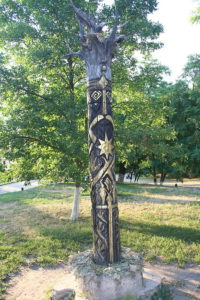 This should come to no surprise to anyone because the Vikings traveled as far east as Baghdad, as south as North Africa, and as west as the Eastern seaboard of North America. We know from new finds in archaeology that there was a thriving eastern trade between the Vikings and places such as Constantinople, Baghdad, and a number of cities around the Caspian Sea. Vikings left runes, carvings of their ships, and other artifacts where they went. It makes sense that they mingled with the local populace, and even obtained mates from those locations.
This should come to no surprise to anyone because the Vikings traveled as far east as Baghdad, as south as North Africa, and as west as the Eastern seaboard of North America. We know from new finds in archaeology that there was a thriving eastern trade between the Vikings and places such as Constantinople, Baghdad, and a number of cities around the Caspian Sea. Vikings left runes, carvings of their ships, and other artifacts where they went. It makes sense that they mingled with the local populace, and even obtained mates from those locations.
Heathenry is Egalitarian
So, it makes sense that Heathenry should be egalitarian, in respect to other faiths. Heathens incorporated the gods of others with their own gods, and worshiped whatever gods made sense to them.
Christianity, however, is a religion of persecutors. I have plenty of documented evidence how pagans were constantly forced to convert — often at sword point. The so-called Christian persecution by Romans doesn’t really hold up when comparing the biblical texts to Roman historians. Did persecution occur? I don’t doubt some did, but I more suspect those stories were made up to provide martyrs for the church.
7. Heathenism treats men and women more as equals; Christianity is misogynistic
Heathenry treats our men and women as equals now, and in the past, they were treated almost as equals. We know that the concept of the shieldmaiden isn’t a fanciful story, given that we’re now discovering burials with swords and weapons of war include women, whose skeletons were mistaken as men’s until someone thought to run DNA analysis on them.
Misogyny as a Christian Tradition
 Unfortunately, most of our modern beliefs and misogyny stems from our Christian traditions. That women could never be warriors, that they didn’t have a role in society, other than producing babies, and that they didn’t travel with the Viking men. And yet, we’re now finding more and more graves that had presumably Viking men contain female skeletons with swords.
Unfortunately, most of our modern beliefs and misogyny stems from our Christian traditions. That women could never be warriors, that they didn’t have a role in society, other than producing babies, and that they didn’t travel with the Viking men. And yet, we’re now finding more and more graves that had presumably Viking men contain female skeletons with swords.
Now, some people discount this, saying that they didn’t think the women actually used the swords, but as one archaeologist so deftly put it, “Would there even be an argument that the person buried with the sword was a warrior, if that person was male?” Excellent point.
Women were often priestesses called Gydhja. Heathens revered these women and they helped people when it came to healing, seeing the future, and talking to the gods. Yes, there were priests (Godhi), but women played a significant role as well.
Although nowadays some sects of Christianity allow women priests, this is something that has occurred within the past fifty years. Even so, many sects–including the Catholic Church–do not allow priestesses. Obviously a travesty and it aligns with what is in their bible.
Women Fought and Traded Alongside Viking Men
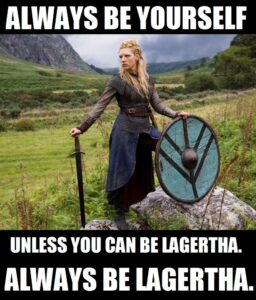 Preconceived notions aside, we know from burials that women did accompany men given the strontium isotopes in their teeth. And while more Viking men than women came from Scandinavia, there was a large enough faction in both sexes which came from other places. In other words, there was more diversity in women than men, but at the same time, there were enough men who came from different places who were given Viking-style graves to suggest that the women weren’t slaves or concubines, necessarily. The grave goods in the burials suggest that they were people of some status other than slaves.
Preconceived notions aside, we know from burials that women did accompany men given the strontium isotopes in their teeth. And while more Viking men than women came from Scandinavia, there was a large enough faction in both sexes which came from other places. In other words, there was more diversity in women than men, but at the same time, there were enough men who came from different places who were given Viking-style graves to suggest that the women weren’t slaves or concubines, necessarily. The grave goods in the burials suggest that they were people of some status other than slaves.
Not all women who came with the Vikings were warriors, though. Most likely many of them were traders, artisans, skilled crafters of goods, and other support laborers. Sure, there were the camp followers, but there was also a need for someone to support the armies or raiding parties, as well as establish connections with the locals in the area. Both men and women could easily fill that role.
Women in Viking Society Had More Rights
We know that a woman could divorce a man under certain circumstances. We also know that women could own land, titles, and a fair amount of property, especially if they were widowed. Women were priestesses, and seidr was considered more of feminine magic than male magic. Freyja was a major deity, right alongside Odin and Thor. We know that Freyja gets first pick of the dead warriors — which presumably includes female warriors. Yeah, Odin gets the second cut. Think about that.
I’m not claiming that everything was fair for women. In fact we see in our myths that Odin was and could be downright misogynous. Just read the passages from the Havamal about his belief concerning women, and I rest my case.
Christianity is Misogynous
Okay, so let’s look at what Christianity says about women. Paul says women should obey their husbands in Corinthians. Timothy has a slew of bullshit. Outside of the Bible, you have people like Martin Luther saying “If a woman grows weary and at last dies from childbearing, it matters not. Let her die from bearing, she is there to do it.” Wow. What an asshole.
Women have almost always been the victims of witch hunts since Christianity began. The “Thou shall not suffer a witch to live” in the Bible (Exodus 22:18) has given religious leaders a reason to murder innocent women throughout the ages. And while men did get caught up in this bullshit, more often women are the targets.
6. Most Heathens accepts Science as fact; Christians, not so much
Most Heathens accept science and the information it has brought to us on how our world was formed, Sure, we have our own version of fundamentalism, but if pressed, I think most Heathens would accept the latest archaeological findings.
Norse Creation Stories
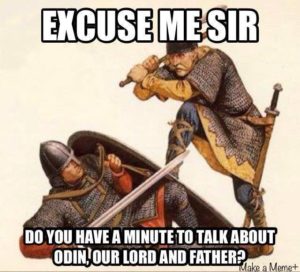 Our religion has its own creation stories. We certainly don’t accept that the world was created in six days like the Christians. Most of us also don’t believe that our world came into being when fire and ice joined together and made rime that a cow licked to create Frost Giants and gods. And most of us don’t believe that Odin and his brothers killed Ymir to create our world. If hard pressed, I’d say that Heathens consider the Norse creation story as a myth and not fact. I believe the story is an allegory of sorts, explaining to a Bronze Age to Iron Age culture how the world came into existence. It gives a satisfactory tale that people enjoy listening to.
Our religion has its own creation stories. We certainly don’t accept that the world was created in six days like the Christians. Most of us also don’t believe that our world came into being when fire and ice joined together and made rime that a cow licked to create Frost Giants and gods. And most of us don’t believe that Odin and his brothers killed Ymir to create our world. If hard pressed, I’d say that Heathens consider the Norse creation story as a myth and not fact. I believe the story is an allegory of sorts, explaining to a Bronze Age to Iron Age culture how the world came into existence. It gives a satisfactory tale that people enjoy listening to.
Viking Creation Stories Are Oral Traditions, Similar to the Children’s Game of Telephone
Viking stories were oral traditions. That means they weren’t written down. Sure, we have images of certain stories that show that the key components were still told, but oral traditions change after time. Since the creation story was written down well after the Viking Age, chances are it changed quite a bit over the years. Chances are the story people told before the Viking Age began and what they told after Scandinavia was Christianized were probably very different, as our Northern ancestors told and retold the stories countless times, embellishing them for the audience, similar to the children’s game of telephone. (Or is it called “operator?” I can’t remember.)
My point is Heathens generally don’t consider these stories as gospel. They are stories about our gods and heroes that have elements of truth in them, but aren’t considered a science text. Even so, we have sagas that have led us to discoveries such as the Viking settlement in North America and other interesting archaeological finds.
5. Heathens consider our writings incomplete and written by humans; Christians believe that their Bible is the word of their god
 Bronze age to Iron age peoples wrote the Bible, not their god. There are so many inconsistencies within the Bible that you really can’t expect to take the text as law. Heathens, on the other hand, know that our stories were passed down in an oral tradition until someone like Snorri Sturluson wrote them down. We know they’re not complete, and we know that they’ve been influenced by Christianity.
Bronze age to Iron age peoples wrote the Bible, not their god. There are so many inconsistencies within the Bible that you really can’t expect to take the text as law. Heathens, on the other hand, know that our stories were passed down in an oral tradition until someone like Snorri Sturluson wrote them down. We know they’re not complete, and we know that they’ve been influenced by Christianity.
We also know that there are common themes in the Norse stories we read. For example, we know that Tyr sacrificed his hand to Fenrir because we see images of Fenrir and Tyr on artifacts.
What about the Havamal?
 Some believe the Havamal is Odin’s own writings. I can’t say for certain, but there might be a glimmer of truth to that. Still, if you believe the Havamal is Odin’s own words, that’s okay. He provides guidelines and not laws like the Christian god for how to live your life. It’s simply words of wisdom coming from the All Father.
Some believe the Havamal is Odin’s own writings. I can’t say for certain, but there might be a glimmer of truth to that. Still, if you believe the Havamal is Odin’s own words, that’s okay. He provides guidelines and not laws like the Christian god for how to live your life. It’s simply words of wisdom coming from the All Father.
The Havamal does have misogynistic statements in it. But you do have to consider the source–if indeed Odin wrote it. I don’t consider Odin a role model for how to treat women, and you shouldn’t either. So, like anything, Heathens take the story with a grain of salt. Or they should.
 Heathens Accept Unverified Personal Gnosis or UPG (More on this later)
Heathens Accept Unverified Personal Gnosis or UPG (More on this later)
As Heathens we accept that the Heathen gods are still around and speak to us personally. We don’t require a church to hear our gods.
Okay, I’ve espoused enough for this time why Heathenry is infinitely better than Christianity. I’ll hopefully have a wrap up sometime soon. Again, take what you like out of this and tell me what you think in the comments section.
—
Disclaimer: This post contains affiliate links. If you purchase something from these links, I get a small stipend which helps support The Rational Heathen. I would encourage you to support my site. Thanks.
Did you know you can become my patron for as little as $5 a month? This entitles you to content not posted anywhere else. Plus you get to see posts like this three days before the public! Without patrons, I’d be having a very hard time keeping this blog going. Become a patron today! Become a Patron!
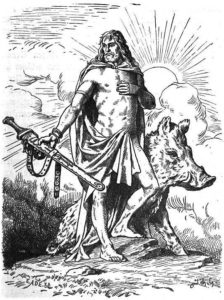 We’re coming up on August 1st, which is the August Harvest Festival, Hlæfæst. It’s also known to most modern pagans as Lammas. If you’re still using the AFA Holiday wheel-of-the-year, it’s called Freyfaxi. For obvious reasons, I’m not keen on the AFA world, and after having read about the story of Freyfaxi, I don’t consider it a good name for a harvest festival, although Freyfest might be more in tune with the holiday.
We’re coming up on August 1st, which is the August Harvest Festival, Hlæfæst. It’s also known to most modern pagans as Lammas. If you’re still using the AFA Holiday wheel-of-the-year, it’s called Freyfaxi. For obvious reasons, I’m not keen on the AFA world, and after having read about the story of Freyfaxi, I don’t consider it a good name for a harvest festival, although Freyfest might be more in tune with the holiday. Hlæfæst is probably more of a modern day creation than it is a holiday from the past. We can kind of associate it with Lammas, which is the Wiccan/neopagan version of the holiday. It’s the first of three harvest festivals many Wiccans/neopagans celebrate. Lammas literally means “Loaf Mass” or “Loaf Feast.” As I said above, it has been Christianized, like so many of the pagan holidays, that we have to go by what little we can gleam from past traditions and historical notes.
Hlæfæst is probably more of a modern day creation than it is a holiday from the past. We can kind of associate it with Lammas, which is the Wiccan/neopagan version of the holiday. It’s the first of three harvest festivals many Wiccans/neopagans celebrate. Lammas literally means “Loaf Mass” or “Loaf Feast.” As I said above, it has been Christianized, like so many of the pagan holidays, that we have to go by what little we can gleam from past traditions and historical notes. Although Lammas celebrates a god from the Celtic pantheon, there’s no reason why we can’t appropriate it and call it Hlæfæst. Hlæfæst celebrates the grain harvest, which honors Sif, Thor, Freyr, and Freyja. Rather than just honor Freyr with Freyfaxi, I think honoring four gods and goddesses is better because these are the gods who make the grain grow. It makes sense to give thanks to them.
Although Lammas celebrates a god from the Celtic pantheon, there’s no reason why we can’t appropriate it and call it Hlæfæst. Hlæfæst celebrates the grain harvest, which honors Sif, Thor, Freyr, and Freyja. Rather than just honor Freyr with Freyfaxi, I think honoring four gods and goddesses is better because these are the gods who make the grain grow. It makes sense to give thanks to them.
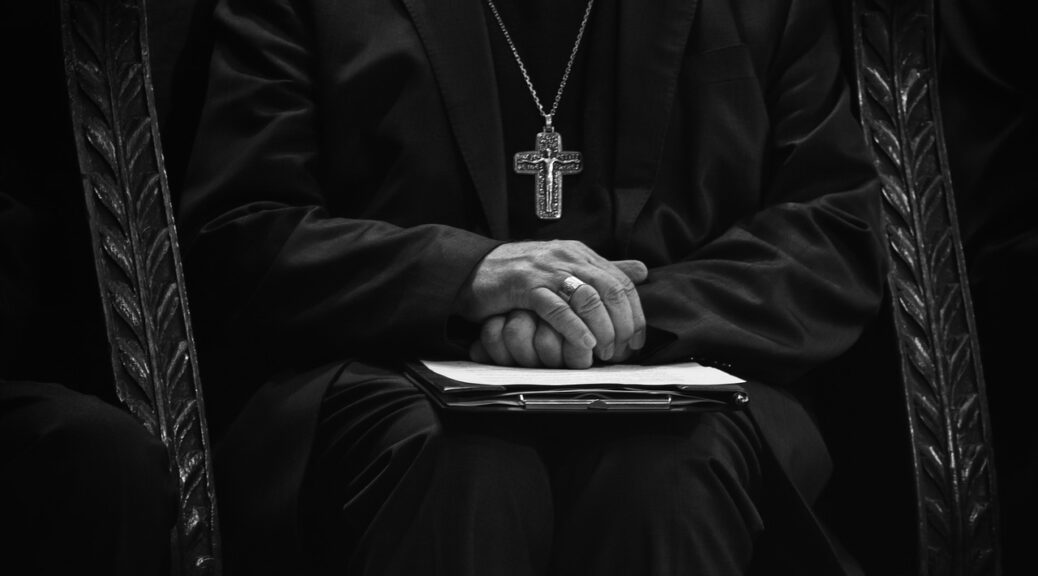
 I read this
I read this  Okay, okay, I bet you’re wondering where the context is, and that I am going to give you right now. He is talking about
Okay, okay, I bet you’re wondering where the context is, and that I am going to give you right now. He is talking about 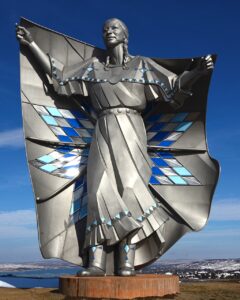
 Now, I know lots of Christians would find the attitude this editor had about Native Americans to be appalling–or, at least, I hope they would. But honestly? Would they applaud children being taken away from their families to be indoctrinated in the Catholic (or whatever else) Church? Many apparently never living past their school years? Think about when you grew up. Do you remember kids dying and being buried behind the school? Probably not, unless you were a victim of one of these schools.
Now, I know lots of Christians would find the attitude this editor had about Native Americans to be appalling–or, at least, I hope they would. But honestly? Would they applaud children being taken away from their families to be indoctrinated in the Catholic (or whatever else) Church? Many apparently never living past their school years? Think about when you grew up. Do you remember kids dying and being buried behind the school? Probably not, unless you were a victim of one of these schools.  Yeah, he feels badly for “the little tykes.” He blames the secular authority for the deaths. Never mind that the Catholic Church has HOW MUCH money? (See the $300 million dollar quote above.) Never mind the Catholic Church has more gold than Fort Knox. But dammit! They’re pagan! And we can’t have that, can we? So, it’s better to die a good Christian than live with one’s family as an awful pagan.
Yeah, he feels badly for “the little tykes.” He blames the secular authority for the deaths. Never mind that the Catholic Church has HOW MUCH money? (See the $300 million dollar quote above.) Never mind the Catholic Church has more gold than Fort Knox. But dammit! They’re pagan! And we can’t have that, can we? So, it’s better to die a good Christian than live with one’s family as an awful pagan.


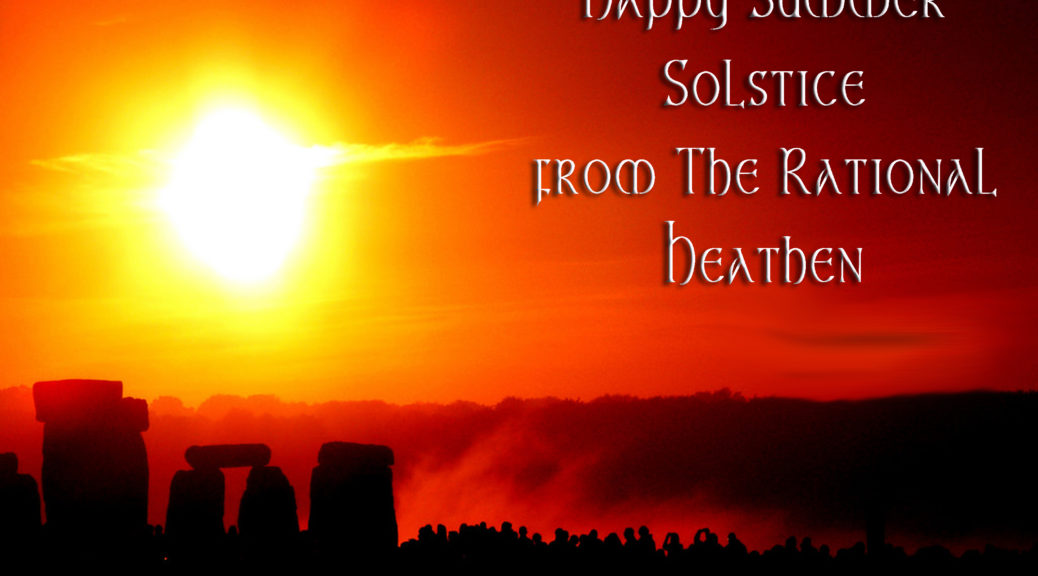
 Somehow each year, summer solstice sneaks up on me. Sure, the days get extraordinarily long here in the Northern Rockies, and sure everything is greening up fast. I have two goat kids who are now almost four weeks old, and yeah, the warmer weather is upon us. Still, I end up feeling unprepared for the solstice.
Somehow each year, summer solstice sneaks up on me. Sure, the days get extraordinarily long here in the Northern Rockies, and sure everything is greening up fast. I have two goat kids who are now almost four weeks old, and yeah, the warmer weather is upon us. Still, I end up feeling unprepared for the solstice.
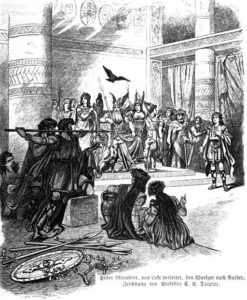 I think of the story
I think of the story  wonder in them–we know what causes the seasons. At some point, people only look forward to the seasons as times for doing human activities, and not just marveling at the season, itself.
wonder in them–we know what causes the seasons. At some point, people only look forward to the seasons as times for doing human activities, and not just marveling at the season, itself. Summer solstice is a time to thank the gods, the landvaetr, and the ancestors for everything. You may wish to have some mead or other offering to leave at your outdoor altar. If you don’t have an outdoor altar, you can choose a favorite tree outside. Whatever your offering is, be sure it is biodegradable and not poisonous to wildlife and pets.
Summer solstice is a time to thank the gods, the landvaetr, and the ancestors for everything. You may wish to have some mead or other offering to leave at your outdoor altar. If you don’t have an outdoor altar, you can choose a favorite tree outside. Whatever your offering is, be sure it is biodegradable and not poisonous to wildlife and pets.
 Please note that these aren’t the only reasons why I am a Heathen, and because a Christian asked, I want to point out the obvious folly behind their beliefs as well. Look, I swallowed the Christian Kool-Aid for years, and eventually my logic won out. I would’ve probably stayed agnostic or even gone atheist, had it not been for Tyr and Thor. More on that later. Let’s go through the last four reasons (and the bonus fifth reason).
Please note that these aren’t the only reasons why I am a Heathen, and because a Christian asked, I want to point out the obvious folly behind their beliefs as well. Look, I swallowed the Christian Kool-Aid for years, and eventually my logic won out. I would’ve probably stayed agnostic or even gone atheist, had it not been for Tyr and Thor. More on that later. Let’s go through the last four reasons (and the bonus fifth reason). Oiy! I’m back to bashing Christianity again. But let’s talk about the Christ myth for a moment, shall we? I’ll get back to why I follow the Heathen gods in a moment. The Christian bible goes into a vast lineage of Joseph–who was technically NOT Jesus’s father according to the myth, but probably was–all the way back from Adam and Eve.
Oiy! I’m back to bashing Christianity again. But let’s talk about the Christ myth for a moment, shall we? I’ll get back to why I follow the Heathen gods in a moment. The Christian bible goes into a vast lineage of Joseph–who was technically NOT Jesus’s father according to the myth, but probably was–all the way back from Adam and Eve. You knew I had to get a Doctor Who reference in somehow. So, why not, since we’re talking about the past?
You knew I had to get a Doctor Who reference in somehow. So, why not, since we’re talking about the past?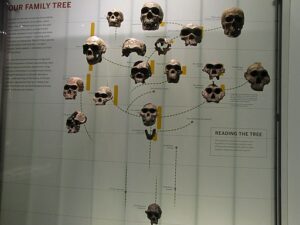 We know the fossil record is legitimate. We know that thousands of archaeologists, paleontologists, and geologists aren’t in a gigantic conspiracy to cover the “truth” up. Shit like that just doesn’t happen. Sure,
We know the fossil record is legitimate. We know that thousands of archaeologists, paleontologists, and geologists aren’t in a gigantic conspiracy to cover the “truth” up. Shit like that just doesn’t happen. Sure, Yahweh decides to punish humans for being ignorant fools by having their descendants inherit their parents’ sin. Then sends his son down (who is their god, himself) and sacrifices himself to get rid of the sin. Only, he doesn’t. You have to get baptized to get that cleaned up. And people still sin despite the baptism. So, Jesus dies and stays dead for what amounts to a three day weekend. To appease himself.
Yahweh decides to punish humans for being ignorant fools by having their descendants inherit their parents’ sin. Then sends his son down (who is their god, himself) and sacrifices himself to get rid of the sin. Only, he doesn’t. You have to get baptized to get that cleaned up. And people still sin despite the baptism. So, Jesus dies and stays dead for what amounts to a three day weekend. To appease himself. When I was young, I quickly figured out Santa Claus and the Easter Bunny didn’t exist. I’d say before I was five, I had it all figured out. That didn’t mean I didn’t want to believe in supernatural things. On the contrary. I’d look for fairies and Elves, and other creatures in the forest outside my home.
When I was young, I quickly figured out Santa Claus and the Easter Bunny didn’t exist. I’d say before I was five, I had it all figured out. That didn’t mean I didn’t want to believe in supernatural things. On the contrary. I’d look for fairies and Elves, and other creatures in the forest outside my home.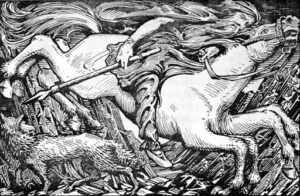 I remember as a kid being utterly fascinated with stories about Loki and Thor. Tyr’s story about how he sacrificed his hand. Idunn’s apples. The building of Asgard. The stories inspired me in ways the bible never could. They were great stories about gods whom I could relate to. The stories had humor, courage, confidence, honor, treachery, love, and self-sacrifice. The bible may have those things, but the stories never appealed to me, except when they spoke about angels.
I remember as a kid being utterly fascinated with stories about Loki and Thor. Tyr’s story about how he sacrificed his hand. Idunn’s apples. The building of Asgard. The stories inspired me in ways the bible never could. They were great stories about gods whom I could relate to. The stories had humor, courage, confidence, honor, treachery, love, and self-sacrifice. The bible may have those things, but the stories never appealed to me, except when they spoke about angels. This, this was what I wanted. Especially Tolkien. The story, while fiction, held some ancient truths in them. Dwarves mine and craft beautiful things. Light Elves sing and are in tune with nature. Trolls are dangerous; dragons hoard gold. Tolkien’s works were inspired by the Heathen stories. Even if he did grow up Catholic–some he and I had in common–he used his knowledge to paint an imaginative Heathen world.
This, this was what I wanted. Especially Tolkien. The story, while fiction, held some ancient truths in them. Dwarves mine and craft beautiful things. Light Elves sing and are in tune with nature. Trolls are dangerous; dragons hoard gold. Tolkien’s works were inspired by the Heathen stories. Even if he did grow up Catholic–some he and I had in common–he used his knowledge to paint an imaginative Heathen world.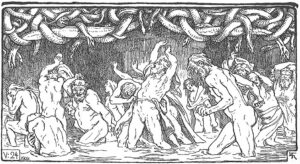 Look, I know some of you are homosexual, practice polyamory, or are trans. I am not. I am heterosexual and monogamous. That is my choice. What your choice is doesn’t concern me as long as you’re not exploiting minors or harming animals. I look at you as a person, and if you happen to be an asshole, then I don’t like you. But sexuality doesn’t figure into the equation, whether you’re my friend or not, and I suspect the same is true with our gods. I doubt seriously the gods care what you do in your bedroom as long as it’s between consenting adults. It’s when you violate oaths, commit adultery, or murder someone, that’s when they take serious offense.
Look, I know some of you are homosexual, practice polyamory, or are trans. I am not. I am heterosexual and monogamous. That is my choice. What your choice is doesn’t concern me as long as you’re not exploiting minors or harming animals. I look at you as a person, and if you happen to be an asshole, then I don’t like you. But sexuality doesn’t figure into the equation, whether you’re my friend or not, and I suspect the same is true with our gods. I doubt seriously the gods care what you do in your bedroom as long as it’s between consenting adults. It’s when you violate oaths, commit adultery, or murder someone, that’s when they take serious offense.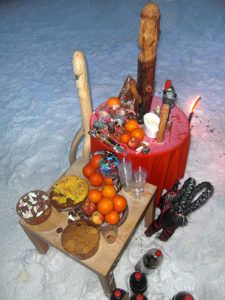 Many Heathen gods are nature gods. That means their powers come from nature. Just as Skadi brings the cold and snow, Thor brings the lightning and rain. Sif and Freyr bring the harvest. Our gods are part of our world and yes, it pains them when humans defile it. Humans haven’t been granted stewardship of the world; we are a part of it and must live according to its laws. It is folly when religions treat our world like we own it. Okay, we’re here and the dominant species, but by the gods, plenty of things like diseases, asteroids, and volcanoes can wiped us off the face of the Earth.
Many Heathen gods are nature gods. That means their powers come from nature. Just as Skadi brings the cold and snow, Thor brings the lightning and rain. Sif and Freyr bring the harvest. Our gods are part of our world and yes, it pains them when humans defile it. Humans haven’t been granted stewardship of the world; we are a part of it and must live according to its laws. It is folly when religions treat our world like we own it. Okay, we’re here and the dominant species, but by the gods, plenty of things like diseases, asteroids, and volcanoes can wiped us off the face of the Earth.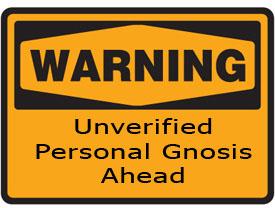 This is probably the most controversial belief, but yes, I know Tyr, Thor, Odin, Freyr, Freyja, Loki, and a host of other deities. This is pure UPG or
This is probably the most controversial belief, but yes, I know Tyr, Thor, Odin, Freyr, Freyja, Loki, and a host of other deities. This is pure UPG or 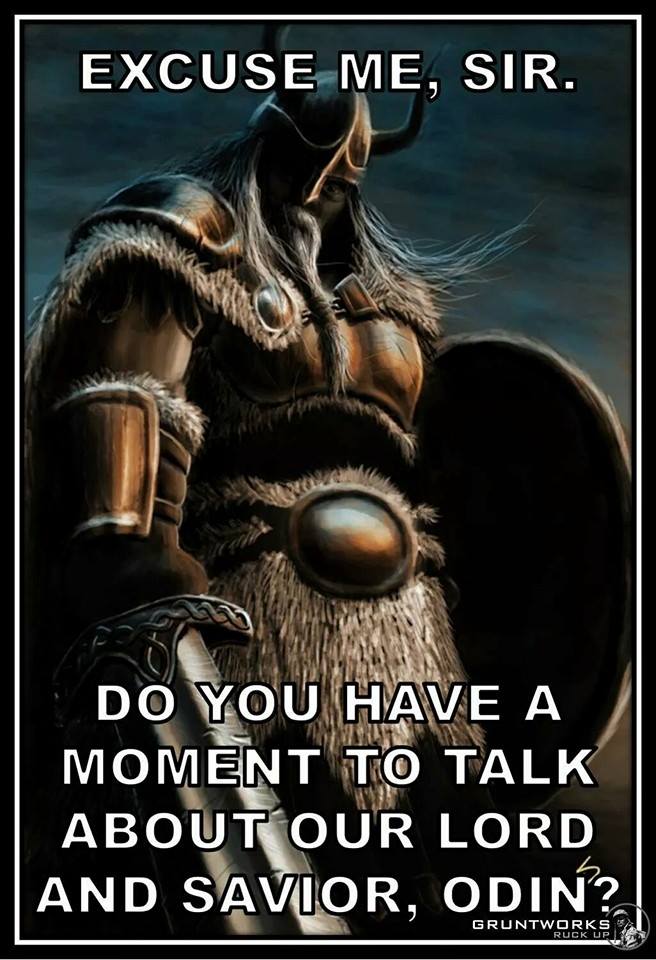 To make this ridiculously long post even longer, I had to add this dig at Christians. Most Christians are assholes. Sure, there are Christians who are nice. Just like I know good and kind atheists, agnostics, Jews, Wiccans, Muslims, and peoples of other faiths. The problem I have is that many Christians tend to be egotistical and self-righteous. They “know” because they believe in Jesus that they’re going to heaven, no matter what they do. They wear their faith on their sleeve. And they wouldn’t do good works if it didn’t give them brownie points in heaven. They become passive-aggressive when you don’t agree with them, telling you they’ll pray for your soul. Guess what? I don’t need their self righteous attitude.
To make this ridiculously long post even longer, I had to add this dig at Christians. Most Christians are assholes. Sure, there are Christians who are nice. Just like I know good and kind atheists, agnostics, Jews, Wiccans, Muslims, and peoples of other faiths. The problem I have is that many Christians tend to be egotistical and self-righteous. They “know” because they believe in Jesus that they’re going to heaven, no matter what they do. They wear their faith on their sleeve. And they wouldn’t do good works if it didn’t give them brownie points in heaven. They become passive-aggressive when you don’t agree with them, telling you they’ll pray for your soul. Guess what? I don’t need their self righteous attitude.
 Also, our gods and goddesses are colorblind. That means that it doesn’t matter what ethnicity you come from, if you’re Heathen, you’re with us. Yeah there are some folkish (AKA racist) types who have decided for whatever bizarre reason that only white, Northern peoples can worship our gods, but that’s totally incorrect, especially given the recent DNA and bone mineral compositions discovered in archaeology. People who have occupied Viking burials have proven to originate in Poland, Russia, Slavic countries, Mediterreanan countries (including Italy and Spain), Mongolia, and North Africa.
Also, our gods and goddesses are colorblind. That means that it doesn’t matter what ethnicity you come from, if you’re Heathen, you’re with us. Yeah there are some folkish (AKA racist) types who have decided for whatever bizarre reason that only white, Northern peoples can worship our gods, but that’s totally incorrect, especially given the recent DNA and bone mineral compositions discovered in archaeology. People who have occupied Viking burials have proven to originate in Poland, Russia, Slavic countries, Mediterreanan countries (including Italy and Spain), Mongolia, and North Africa. This should come to no surprise to anyone because the Vikings traveled as far east as Baghdad, as south as North Africa, and as west as the Eastern seaboard of North America. We know from new finds in archaeology that there was a thriving eastern trade between the Vikings and places such as Constantinople, Baghdad, and a number of cities around the Caspian Sea. Vikings left runes, carvings of their ships, and other artifacts where they went. It makes sense that they mingled with the local populace, and even obtained mates from those locations.
This should come to no surprise to anyone because the Vikings traveled as far east as Baghdad, as south as North Africa, and as west as the Eastern seaboard of North America. We know from new finds in archaeology that there was a thriving eastern trade between the Vikings and places such as Constantinople, Baghdad, and a number of cities around the Caspian Sea. Vikings left runes, carvings of their ships, and other artifacts where they went. It makes sense that they mingled with the local populace, and even obtained mates from those locations.
 Preconceived notions aside, we know from burials that women did accompany men given the strontium isotopes in their teeth. And while more Viking men than women came from Scandinavia, there was a large enough faction in both sexes which came from other places. In other words, there was more diversity in women than men, but at the same time, there were enough men who came from different places who were given Viking-style graves to suggest that the women weren’t slaves or concubines, necessarily. The grave goods in the burials suggest that they were people of some status other than slaves.
Preconceived notions aside, we know from burials that women did accompany men given the strontium isotopes in their teeth. And while more Viking men than women came from Scandinavia, there was a large enough faction in both sexes which came from other places. In other words, there was more diversity in women than men, but at the same time, there were enough men who came from different places who were given Viking-style graves to suggest that the women weren’t slaves or concubines, necessarily. The grave goods in the burials suggest that they were people of some status other than slaves. Our religion has its own creation stories. We certainly don’t accept that the world was created in six days like the Christians. Most of us also don’t believe that our world came into being when fire and ice joined together and made rime that a cow licked to create Frost Giants and gods. And most of us don’t believe that Odin and his brothers killed Ymir to create our world. If hard pressed, I’d say that Heathens consider the Norse creation story as a myth and not fact. I believe the story is an allegory of sorts, explaining to a Bronze Age to Iron Age culture how the world came into existence. It gives a satisfactory tale that people enjoy listening to.
Our religion has its own creation stories. We certainly don’t accept that the world was created in six days like the Christians. Most of us also don’t believe that our world came into being when fire and ice joined together and made rime that a cow licked to create Frost Giants and gods. And most of us don’t believe that Odin and his brothers killed Ymir to create our world. If hard pressed, I’d say that Heathens consider the Norse creation story as a myth and not fact. I believe the story is an allegory of sorts, explaining to a Bronze Age to Iron Age culture how the world came into existence. It gives a satisfactory tale that people enjoy listening to.
 Heathens Accept Unverified Personal Gnosis or UPG (More on this later)
Heathens Accept Unverified Personal Gnosis or UPG (More on this later)
 Yes, yes, there was most likely a
Yes, yes, there was most likely a 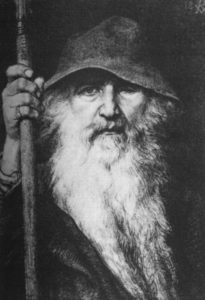 Okay, so you’ve read the whole Norse creation myth how ice and fire collided to make a rime, and a cow licked the salt from Ymir. And how Odin and his bros slayed Ymir and created Midgard. And how Odin and his bros created Ask and Embla…
Okay, so you’ve read the whole Norse creation myth how ice and fire collided to make a rime, and a cow licked the salt from Ymir. And how Odin and his bros slayed Ymir and created Midgard. And how Odin and his bros created Ask and Embla… (I kind of like this), but honestly, is it for eternity? We don’t know. And oddly enough, Valhalla has plenty of adulterers, oathbreakers, and murderers, according to the sagas, so I really doubt Nastrond keeps them all there.
(I kind of like this), but honestly, is it for eternity? We don’t know. And oddly enough, Valhalla has plenty of adulterers, oathbreakers, and murderers, according to the sagas, so I really doubt Nastrond keeps them all there.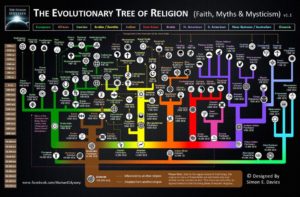 Although religion primarily came from the Middle East, we still have proof that Stonehenge and other monuments were erected some 5000 or more years ago–around the same time as the Sumerians were creating their own monuments. I can’t say that Heathenism sprung from these early roots of sun and moon worship, but certainly there are links to shamanistic and animistic beliefs.
Although religion primarily came from the Middle East, we still have proof that Stonehenge and other monuments were erected some 5000 or more years ago–around the same time as the Sumerians were creating their own monuments. I can’t say that Heathenism sprung from these early roots of sun and moon worship, but certainly there are links to shamanistic and animistic beliefs.
 When was the last time you had a Heathen knock on your door and ask you if you knew about the good news from Odin?
When was the last time you had a Heathen knock on your door and ask you if you knew about the good news from Odin?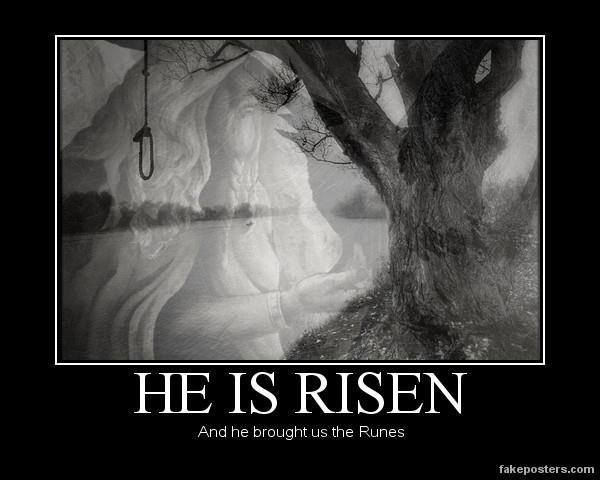
 Every year about this time, Heathens, pagans, and those who don’t celebrate the Christian holiday of Easter are quick to point out that Easter isn’t a Christian holiday; yours truly included. But I do wish to address Easter as a Christian holiday, even if it has taken its name and customs from pagan celebrations.
Every year about this time, Heathens, pagans, and those who don’t celebrate the Christian holiday of Easter are quick to point out that Easter isn’t a Christian holiday; yours truly included. But I do wish to address Easter as a Christian holiday, even if it has taken its name and customs from pagan celebrations. Now, before we go into all the pagan traditions surrounding Easter, I’m going to point out that despite my dislike of Christianity and its destruction of paganism, pagans can only superficially claim Easter because it is around the Vernal Equinox. The whole fairy tale of the “purportedly magic Jew” rising from the dead after being crucified is more or less their shtick. It happens around the time of Passover, which is based on the Book of Exodus in the Bible.
Now, before we go into all the pagan traditions surrounding Easter, I’m going to point out that despite my dislike of Christianity and its destruction of paganism, pagans can only superficially claim Easter because it is around the Vernal Equinox. The whole fairy tale of the “purportedly magic Jew” rising from the dead after being crucified is more or less their shtick. It happens around the time of Passover, which is based on the Book of Exodus in the Bible. are ingrained in our psyches. But it is a Christian story. Why? Because it doesn’t quite mimic any other pagan myth out there.
are ingrained in our psyches. But it is a Christian story. Why? Because it doesn’t quite mimic any other pagan myth out there. Sure, Easter took on the pagan trappings of Eostre/Ostara. No bunnies were visiting Christ on the cross, as far as we know. And while eggs are purported to be the symbol of rebirth among the Jewish peoples, I haven’t done enough research into that to back that up. But you can read about my opinions,
Sure, Easter took on the pagan trappings of Eostre/Ostara. No bunnies were visiting Christ on the cross, as far as we know. And while eggs are purported to be the symbol of rebirth among the Jewish peoples, I haven’t done enough research into that to back that up. But you can read about my opinions, 
 You’ve heard me say it over and over, the
You’ve heard me say it over and over, the  Our gods expect us to take responsibility for our actions. Sure, we have the concept of luck or orlog—the ancient Heathens recognized that sometimes, no matter how much you try, shit happens. Some folks seem to have rotten luck that is tied to their wyrd or fate. But I would point out that many people make their own luck. Sure, it’s not your fault you were born in the circumstances you’re in. And sometimes, no matter how careful or clever you are, shit just happens. But often the choices people make affects their orlog. I mean, take drinking and driving. You might get away with drunk driving for a while, but I wouldn’t be surprised if you got into a traffic accident and got killed or killed someone. Or you might luck out and get arrested for DUI. Of course, luck is relative when it comes to that.
Our gods expect us to take responsibility for our actions. Sure, we have the concept of luck or orlog—the ancient Heathens recognized that sometimes, no matter how much you try, shit happens. Some folks seem to have rotten luck that is tied to their wyrd or fate. But I would point out that many people make their own luck. Sure, it’s not your fault you were born in the circumstances you’re in. And sometimes, no matter how careful or clever you are, shit just happens. But often the choices people make affects their orlog. I mean, take drinking and driving. You might get away with drunk driving for a while, but I wouldn’t be surprised if you got into a traffic accident and got killed or killed someone. Or you might luck out and get arrested for DUI. Of course, luck is relative when it comes to that.


